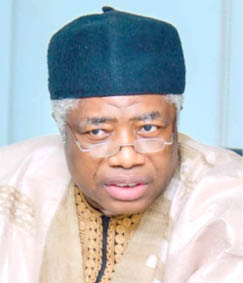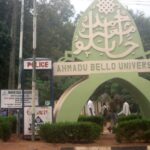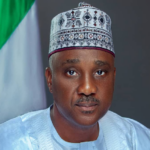The national president of the Ahmadu Bello University (ABU) Alumni Association, Worldwide, Adamu Mamman Kontagora, has said that education is the most valuable asset to any country.
Kontagora made the assertion following the statistics by the United Nations Children’s Fund (UNICEF) that revealed that over 18 million children are out of school in Nigeria, which has been described as a daunting challenge that threatens the country’s future.
He stated this while speaking at the association’s 2024 annual lecture dinner and award night in Abuja, recently.
According to him, education is a cornerstone for any developmental initiative and the provision of education cuts across primary, secondary, and tertiary levels.
- Yultide: NCAA brings in 10 new aircraft, to ease operations
- Complaints commission, immigration to monitor employment of local engineers by foreign coy
Acknowledging that universities are engines of social and economic growth,he said: “The quantity and more importantly, the quality of universities reveal a nation’s determination to stay ahead globally.”
“This perhaps explains why many countries, corporate organizations, and individuals invest substantially in education, research, and information,” he added.
Speaking on the event, which captured the role of alumni in advancing education in Nigeria, Kontagora said that alumni associations have a crucial responsibility in contributing toward sustainable educational growth, particularly as reflected in the theme of the lecture: “The Role of Alumni Associations in Advancing University Education in Nigeria.”
In line with this commitment, the association unveiled the proposed Ahmadu Bello University Centrer for Reproductive Medicine, the first of its kind in Northern Nigeria.
“This novel project will undoubtedly improve the healthcare delivery system in Nigeria, among other laudable objectives,” Kontagora said.
“The government’s role in shaping the future of any nation is critical, and this is visible in education. A well-educated population drives economic growth, fosters innovation, and strengthens democratic institutions. In Nigeria, where literacy rates remain a concern and millions of children are out of school and government intervention is essential.”
He said: “The Recognition Award is meant to encourage awardees made up mostly of alumni members, corporate organizations, and friends of the university to do more and also to acknowledge openly our appreciation as well as motivate others to do the same for the overall benefit of our alma mater.”
In line with this commitment, the association unveiled the proposed Ahmadu Bello University Center for Reproductive Medicine, the first of its kind in Northern Nigeria. “This novel project will undoubtedly improve the healthcare delivery system in Nigeria, among other laudable objectives,” Kontagora said in his address.
“The ultimate objective of today’s event is to project the university, the biggest in sub-Saharan Africa, through the instrumentality of its notable alumni members, friends, and associates. May I therefore, with utmost humility, on behalf of the entire membership of the Ahmadu Bello University Alumni Association worldwide request for your support and assistance towards the funding of Ahmadu Bello University Center for Reproductive Medicine” he added.
“We are indeed grateful for the encouragement and co-oporation we have received from the Vice Chancellor, Management, and the University Community since my assumption of office as the President in September 2023 May I also appreciate all donors for their contributions which has made this event a success” he said.
The Speaker of the House of Representatives, Hon. Tajudeen Abbas, who served as a special guest of honour at the event noted the importance of investing in youth, saying, “Our youth represent the heartbeat of this nation and the foundation of our future.” With over 70 per cent of Nigeria’s population under 30, they have immense potential for growth and innovation.
“We must empower our young people with the tools they need to succeed, including quality education, mentorship, and opportunities for entrepreneurship. As we strive to revitalize our education system, it is crucial to bridge the gap between academic theory and practical skills. A skilled workforce is essential for innovation, industrial growth, and sustainable development,” Abbas said.
In his address, the guest speaker, His highness, Malam Muhammadu Munir Jaafar, Madakin Zazzau, emphasized the critical role of alumni associations in rescuing Nigeria’s public universities from financial decline and infrastructural decay.
Delivering his keynote address on ‘the role of Alumni Association in advancing the University system in Nigeria’ the Madakin Zazzau lamented that the dwindling government funding and surging student enrollments are threatening the sustainability of higher education.
He noted that funding for public universities has dropped by 40 per cent over the past five years, while student enrollment has surged by 50 per cent.
“This showed that the funding of education, especially public universities, would continue to drop based on government priorities, especially now when the federal government is facing insecurity challenges such as Boko Haram, Lukurawa insurgents, banditry, kidnapping for ransom, oil bunkering, borders struggling, porous boundaries, Niger Delta militias, and many other insecurities challenges.”
“What this means is that the bulk of the federal government’s annual budget would go to defence and other security matters” he said.
According to him, Public universities are becoming dens for storing research findings with no practical application due to poor funding.
“No budges for research-development in public Universities. To this end, they have become beggars, always with cups in their hands to politicians” he added.
Citing international examples, he urged Nigerian alumni to emulate universities like Harvard, Stanford, and the University of Tokyo, whose alumni have transformed their institutions through strategic partnerships and financial support. Harvard alumni alone have contributed over $10 billion, funding scholarships, research, and infrastructure.
He stressed that Nigerian alumni must transition from merely attending reunions to becoming advocates, fundraisers, and strategic partners in university governance.
He noted that fundraising efforts by alumni, can enhance scholarship opportunities, research initiatives, and infrastructure development.
Additionally, alumni can offer mentorship and internship opportunities, preparing students for leadership roles in various sectors he added.
Madakin Zazzau also reiterate the potential of public-private partnerships, where alumni can leverage their connections with industries to support research and innovation.
“By establishing endowment funds, alumni can provide steady financial support for their universities, ensuring long-term sustainability.”
“These partnerships not only enhance educational development but also contribute to the local and national economies, demonstrating the power of collaboration and Alumni contributions” he said
He cited examples with Japan, where universities collaborate closely with businesses, resulting in technological advancements and national growth,
Singapore’s National University for its success in fostering entrepreneurship through alumni contributions, leading to numerous successful startups.
“Alumni Associations like ABU Zaria have a unique opportunity to use their positions, connections and might to attract the private sector to key into university development and growth. By leveraging our networks, connections as well as experiences outside the university community. We Alumni can do it and create partnerships that would foster innovation and entrepreneurship ABU, Zaria” he said.
In acknowledging the achievements of ABU, His Highness commended the Vice Chancellor, Professor Kabir Bala, for driving academic innovation and maintaining the university’s status as a center of excellence. He also praised the National President of the ABU Alumni Association, Alhaji Adamu Mamman Kontagora, for his leadership in uniting alumni to support the university’s development.
Madakin Zazzau urged alumni to take collective responsibility for the future of their alma mater, noting that the survival and growth of public universities depend on the active involvement of alumni in bridging the gap between academia and industry.
In an exclusive interview before the award night, the Vice-Chancellor of ABU, Prof. Kabir Bala, highlighted the vital role alumni play in sustaining educational institutions, especially in Nigeria, where funding for higher education often falls short.
He commended the alumni association’s contributions to the university’s progress.
“The president and his officials extended an olive branch to the university management,” Bala said.
He came with a mission, realizing that progress depends on cooperation between the university and its alumni.
Discussing the Centre for Reproductive Medicine, Bala explained that the idea initially began as a fertility centre and evolved into a broader platform addressing various reproductive health issues.
He noted the alarming rise in infertility among young couples as a key inspiration.
“The increasing number of young couples struggling with infertility is concerning, and statistics support this,” he added.
The centre aims to leverage Assisted Reproductive Technology (ART) to provide much-needed solutions. While detailed designs have been completed, funding remains a significant challenge.
Prof. Bala reiterated the alumni’s commitment to ensuring the project’s success, emphasising their pivotal role in advancing both education and healthcare in Nigeria.
Meanwhile, the event was attended by prominent Nigerians, government representatives, and corporate organisations as well as well wishers.

 Join Daily Trust WhatsApp Community For Quick Access To News and Happenings Around You.
Join Daily Trust WhatsApp Community For Quick Access To News and Happenings Around You.


